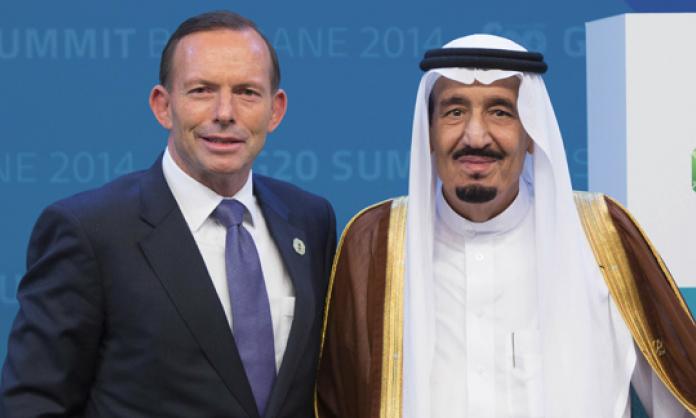In January, flags could be seen flying half mast over government buildings across Australia. This mark of mourning and respect was reserved for a “great reformer” who earned paeans of praise from world leaders – king Abdullah of Saudi Arabia.
Abdullah was many things to many people. For president Obama, “he was always candid and had the courage of his convictions”. For then prime minister Tony Abbott, he was a great mediator between East and West.
For the majority of the 28 million people who live under the Saudi monarchy, he was a tyrant. As flags flew at half mast, a Saudi political activist was being handed a sentence of 10 years and 1,000 lashes for maintaining a blog critical of the government.
Death for blasphemy, stoning for adultery, amputation for stealing – such punishments have earned ISIS the label of “death cult”. These punishments under Abdullah are interpreted as signs of a progressive and reforming regime.
Paying lip service to democracy while giving support to “friendly” tyrants and dictators overseas isn’t just a national pastime for our politicians; it’s a proud tradition that dates back generations.
This year marks the 50th anniversary of another exercise in “spreading freedom”. In 1965, the Indonesian president, Sukarno, who had led the country since independence, was overthrown in a military coup. The carnival of reaction that followed was an opportunity to reorient Indonesian foreign policy toward the West.
But first the communists had to be done away with. The Indonesian Communist Party had long been a thorn in the side of the military, and its growing influence among workers and the poor in Indonesia caused Western leaders endless consternation.
This was accomplished through one of the worst atrocities of the 20th century. Up to one million Communist Party members and sympathisers were rounded up by the military and paramilitary death squads, and summarily executed. This slaughter baptised the new Suharto dictatorship, which ruled over Indonesia for more than three decades.
The Australian prime minister of the time, Harold Holt, is best remembered for an ill-fated swimming trip. He should be remembered for his response to the coup. Holt expressed smug satisfaction with Indonesia’s shift in economic and foreign policy: “With 500,000 to 1 million Communist sympathisers knocked off, I think it is safe to assume a reorientation has taken place”, he said.
The Australian government was with the new regime every step of the way, using Australia’s Indonesian radio station to broadcast anti-Communist propaganda and incite violence. Australian ambassador Keith Shann witnessed people being rounded up and sent to their deaths.
These events were shocking, but the praise heaped on today’s butchers indicates that the rulers of Australia are always happy to cosy up to dictatorships, as long as they are considered “friends”.




